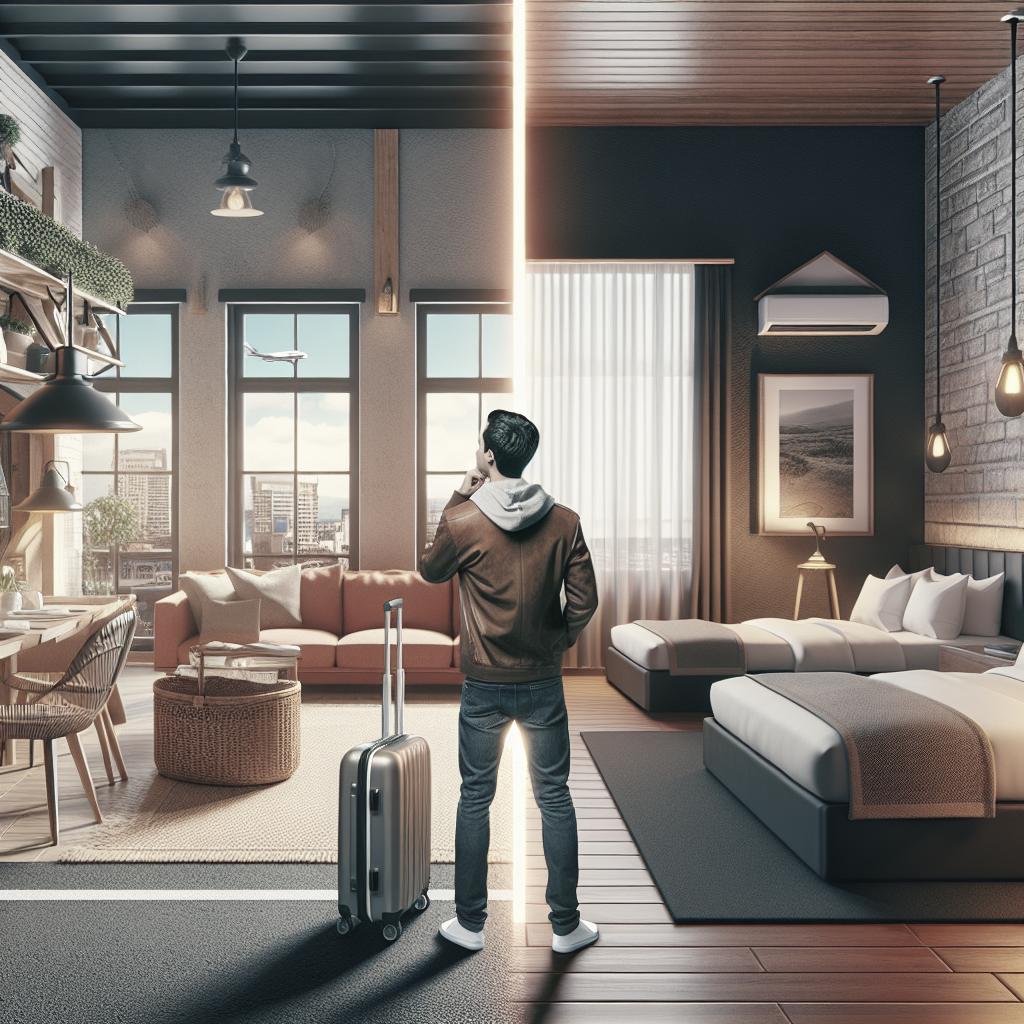“`html
How to Choose Between Airbnb and Hotels
Choosing between Airbnb and hotels for your next stay can often spark a debate accentuated by personal preferences, budget constraints, and situational needs. While hotels boast of standardized services and assurances, Airbnb brings the allure of unique experiences and personal touches. This blog delves into the key differences between the two, examining aspects like cost, legality, and safety concerns. We evaluate Airbnb’s presence and legality in places like Singapore and compare its affordability and safety to traditional hotels. By the end of this post, we’ll provide insightful key takeaways, armed with a detailed table summary to help make the choice that’s best for you.
Airbnb vs. Hotels: An Overview
The battle between Airbnb and hotels is a modern-day travel conundrum. Each offers distinct advantages and caters to different types of travelers. Hotels are entrenched in tradition and consistency, providing a reliable stay typically backed by predominant brands and customer service industries. They are often synonymous with luxury and convenience and are usually strategically situated in central locations, making them highly accessible to major city attractions.
On the other side, Airbnb presents an innovative and flexible alternative to the traditional lodging experience. Since its inception, Airbnb has redefined hospitality by offering a wide array of properties that range from shared rooms to entire homes. This allows travelers to immerse themselves in the local culture to a degree that conventional hotel stays might not offer. With Airbnb’s rise in popularity, it has captured the imagination of travelers seeking more than just a room but an experience.
Airbnb
Airbnb has revolutionized travel with its extensive and diverse listings that help visitors experience destinations in an authentic manner. From urban lofts to seaside cottages and everything in between, travelers can select a property that aligns with their personal preferences and needs. Hosts, who are local property owners, often provide personalized touches, sharing local tips and recommendations that enhance the travel experience.
One of Airbnb’s strongest selling points is its pricing flexibility. By offering accommodations for various budgets, travelers often find that Airbnb is a cost-effective alternative, particularly for longer stays or group travel. However, these savings come with certain caveats concerning regulations and guest safety, making it essential for users to conduct thorough research before confirming a booking.
Hotels
Hotels are synonymous with reliability and luxury. Renowned worldwide, they offer a plethora of amenities, such as room service, housekeeping, concierge services, and often include other recreational facilities like gyms, pools, and spas. These features make hotels appealing for those who prioritize convenience and a full-service experience.
Predominantly located in key areas, hotels provide optimal access to city attractions, making them a practical choice for travelers wanting to minimize commute times. However, this convenience often comes at a premium. Furthermore, the lack of kitchen facilities in most hotels means that travelers often rely on restaurant dining, which can add to the expense of a trip.
Key Differences
Airbnb and hotels have distinct differences in terms of personalization, pricing, and possibly even the experience of customer service. Airbnb thrives on personalization, offering a unique and customizable lodging experience that enables guests to feel more like locals. The implications of sharing a living space can mean direct interaction with hosts, giving insight into daily local life.
In contrast, hotels provide a more standardized form of service, which often guarantees consistency and safety. The controlled environment of a hotel fosters a predictable experience, supported by protocols and trained staff. However, these comforts may limit the encounter with authentic local environments which Airbnb properties may offer.
Key Takeaways
When choosing between Airbnb and hotels, travelers need to determine what matters most for their trip. For those seeking cost-effective and culturally immersive experiences, Airbnb is a solid contender. On the other hand, if luxury, convenience, and assurance are priorities, hotels may provide the superior choice. Ultimately, understanding personal priorities concerning privacy, cost, and amenities is crucial in making an informed decision.
Why Is Airbnb Illegal in Singapore?
The Singapore government maintains a strict stance on short-term rentals, resulting in the illegality of Airbnb within many residential areas. The primary rationale includes maintaining the safety and security of residential environments, preserving housing supply integrity, and safeguarding property values. Unauthorized leasing in Singapore can lead to substantial penalties, significantly deterring the use of Airbnb.
This regulatory approach is shaped by Singapore’s unique urban structure and population density. As Singapore is land-scarce, the government emphasizes the optimization of housing availability, and short-term leases on platforms like Airbnb could potentially disrupt this balance. Thus, travelers to Singapore often need to consider hotels or other legal accommodation types for their stays.
Is Airbnb Cheaper Than Hotels?
Cost is a significant aspect when comparing Airbnb with hotels, and Airbnb often attracts budget-conscious travelers. On average, Airbnb can offer lower rates than hotels, especially for extended stays and large group accommodations. With the choice of entire homes or apartments, Airbnb gives guests the opportunity to cook their meals, further reducing travel costs.
Hotels, however, incorporate certain amenities and convenience factors that could justify their higher costs. These include daily housekeeping, concierge services, high-standard hygiene protocols, and comprehensive security measures. Thus, while Airbnb might present a financially attractive option, it’s essential to weigh these savings against the added comforts and assurances which come with a hotel stay.
Is Airbnb Safe?
Safety is at the forefront of concerns for travelers considering Airbnb, due largely to the personal nature of the stays. Airbnb implements verification processes for hosts and guests alike, including ID checks and secure payment gateways. Reviews and ratings from previous guests often serve as indicators of property reliability and host trustworthiness.
Nevertheless, the nature of staying in a personally-owned property can sometimes entail risks absent in hotels. Issues such as cleanliness, privacy, and unauthorized surveillance have arisen in past scenarios. Therefore, travelers should diligently review listings, communicate with hosts, and verify safety amenities when opting for an Airbnb.
Lessons Learned
| Aspect | Airbnb | Hotels |
|---|---|---|
| Personalization | High – tailored local experiences | Standardized service |
| Cost | Generally cheaper, but varies | Typically higher, with luxury amenities |
| Location | Varied – could be residential or central | Central – typically near major attractions |
| Safety | Good, but dependent on host | Very high due to protocols |
| Legality | Illegal in some locations (e.g., Singapore) | Globally accepted |
“`


